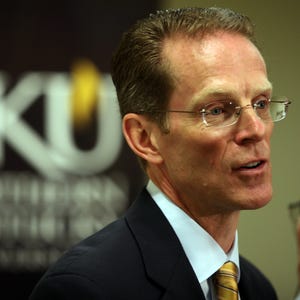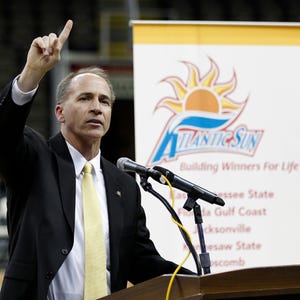A segment of Northern Kentucky University's faculty is increasingly unhappy with the school's bosses, especially since wages have been stagnant for more than five years and it's become common knowledge that top NKU officials took an expensive trip to Sri Lanka last fall.
These low ratings came via the latest annual survey of faculty obtained this week by The Enquirer through an open records request.
NKU President Geoff Mearns
On a scale of zero to four, with zero equating to "very negative" and four equaling "very positive," NKU President Geoff Mearns received a rating of 2.05 for leadership, 2.19 for management and an overall score of 2.17. Sue Ott Rowlands, the school's recently appointed provost and executive vice president for academic affairs who led that trip to Sri Lanka, received an overall rating of 1.86.
In fact, only three of the top 13 administrators received an overall grade above 3.0, which indicates a positive rating. Five had ratings below 2.0, indicating "negative" ratings. Most of the rest hovered between 2.0-2.5.
One commenter wrote that Mearns, who took over at NKU in August 2012, is "arrogant" and "has a negative, even hostile, relationship with the faculty."
"I have never seen faculty and staff morale as low as it is currently," the commenter wrote.
Mearns, in Frankfort Wednesday for his monthly meeting with university presidents from around the state, told The Enquirer that he understands why the marks were low.
"Do I think this is a fair representation of the feelings of all the faculty? Perhaps," Mearns said. "And am I concerned that morale is low and what impact that may have on the educational experience? Yes, of course.
"This just reinforces the understanding of the anxiety on campus about the challenges we have had with our budget and financial constraints that have prohibited us from providing appropriate and deserved salary increases for our faculty and staff."
There hasn't been an across-the-board raise for faculty at the school since before 2010, although there was a 1.5 percent merit increase for some faculty and staff in 2014, and a one-time small bonus in 2011. (School officials note that administrators also have not received raises since 2010.)
In addition, the written comments attached to the survey consistently mentioned the heavy workload, which is normally four classes per semester in the fall and spring. That's higher than many other state universities.
The survey, distributed to the school's 600-member faculty, was conducted between February and March. Professors and instructors are allowed to anonymously rate school administrators, including Mearns and other top officials. More than 100 faculty members submitted surveys on Mearns and Ott Rowland, while other administrators didn't get as much response. NKU currently enrolls more than 15,000 students.
Some survey participants complimented Mearns on his leadership and his public stances on student funding, which lags behind that of other regional universities in Kentucky, and is considerably behind that at the state's flagship schools, the University of Kentucky and the University of Louisville.
"President Mearns is fighting hard and doing everything he can to put NKU on equal footing with our benchmark institutions in the state," one commenter wrote. "I appreciate his assertiveness in dealing with the major roadblock to our progress as a university."
NKU Faculty Senate President Steven Weiss said that he met with Mearns personally to go over the survey, adding that "administrators are never evaluated well."
"I read President Mearn's evaluation and thought it sounded just like things the faculty said about the previous president (Jim Vortruba)," said Weiss, a professor of communication at the school. Weiss has been at NKU for 20 years and has been involved in faculty/administration relations at four different schools.
"If we had a healthy state appropriation and our financial picture was better, the reviews certainly would be better," Weiss said. "But while a lot of that isn't their fault, the faculty have a way of directing that at the people in charge of the school."
One issue mentioned consistently in the survey was a trip taken by Ott Rowlands and several faculty members and administrators to Sri Lanka in September 2014. The school spent more than $31,000 on the trip, according to records obtained through an open records request. It also included a professor from Virginia Tech, where Ott Rowlands last worked, as well as a private NKU booster who paid her own way.
The trip included several stops at different universities and cultural centers in the island nation off the southeast tip of India. Included in expense reports were several expensive dinners and accommodations at exclusive hotels, according to the records.
One commenter said that Ott Rowland has been "excessively irresponsible" in her first year at NKU. "The fact that that she spent thousands and thousands of dollars, only making it public after the fact, on the trip to Sri Lanka at a time when departments are giving back money and faculty haven't had a raise in three years is astounding."
But Mearns defended the trip, saying it "jump-started" a partnership with the academic community in that country and that the study-abroad program at NKU could thrive under new agreements.
International partnerships are a major goal of the university. Administrators and faculty plan another trip later this year to officially sign agreements with the University of Jayawardenapura while other agreements with the University of Colombo have already been inked.
"I do understand why some are concerned if this was a prudent investment, given our current situation," Mearns said. "But we need to make continuing investments to improve our educational experience. And in this instance, we have had good returns in a relatively short period of time."
Said Weiss: "I really don't know a lot about that trip, but I don't think that our administration is responsible for a lot of our financial problems, and Sri Lanka certainly didn't add to those."Hat tip to Mike.


No comments:
Post a Comment